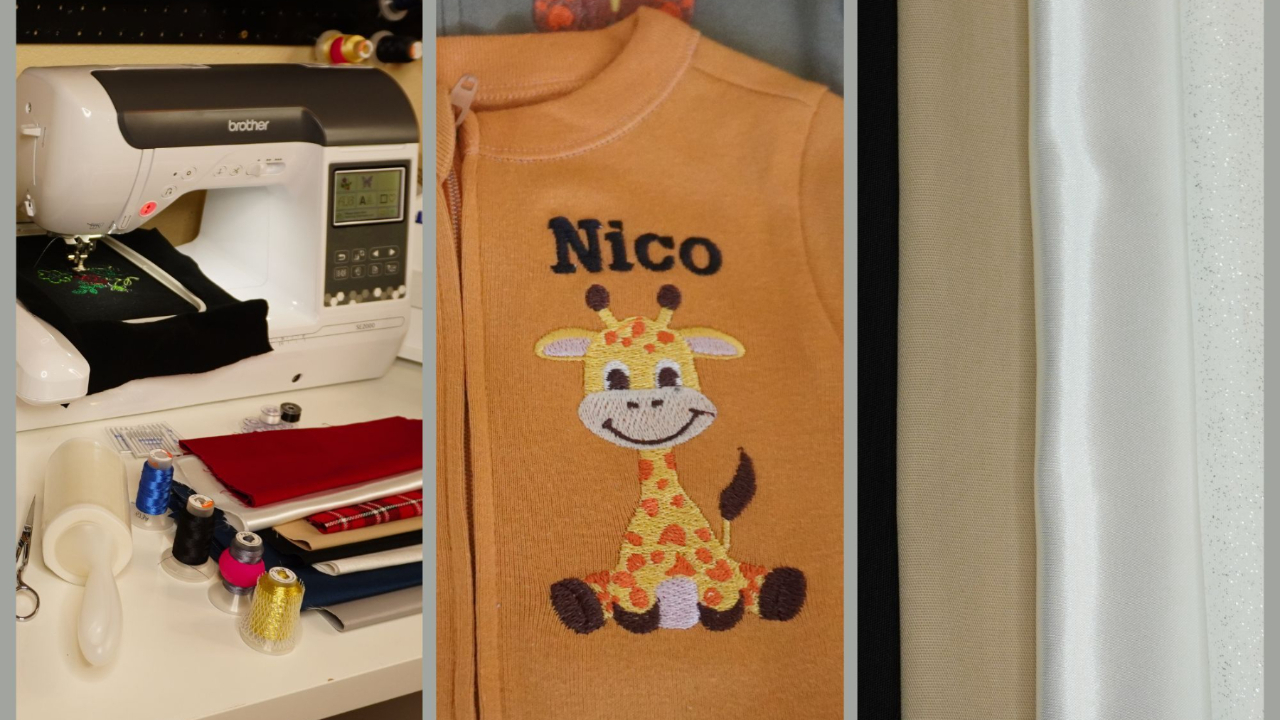
Embroidery on Specialty Fabrics: Silk, Denim & More
Jun 13, 2025Ever struggled with puckering on silk, skipped stitches on denim, or needle breaks on leather? 🧵
Some fabrics require special handling, stabilizers, and stitch settings for embroidery to look perfect.
In this guide, you’ll learn:
✅ How to choose the right stabilizer for tricky fabrics
✅ Best stitch settings for silk, denim, and leather
✅ How to prevent fabric damage and distortion
Let’s dive in! 🚀
🧵 Understanding Specialty Fabrics in Embroidery
Some fabrics react differently to embroidery than standard cotton or polyester blends.
| Fabric Type | Common Challenges | Solution |
|---|---|---|
| Silk & Satin | Puckering, delicate fibers | Light stabilizer, sharp needle, reduce tension |
| Denim & Canvas | Thick fabric, skipped stitches | Heavy stabilizer, strong needle, increase presser foot height |
| Leather & Vinyl | Needle holes, distortion | No stabilizer under fabric, use a wedge-point needle |
📌 Embroidering on Silk & Satin
🌟 Challenges:
❌ Fabric puckers easily
❌ Satin stitches sink into the material
❌ Thread tension can cause distortion
🔹 Best Stabilizer:
✅ Cut-Away Stabilizer for long-term stability
✅ Tear-Away Stabilizer for lightweight silk scarves or garments
🔹 Best Needle:
✔ #75/11 sharp embroidery needle (prevents snagging)
🔹 Best Stitch Settings:
🔹 Reduce stitch density → Too many stitches cause puckering
🔹 Use a light underlay → Prevents stitches from disappearing into the fabric
📝 Pro Tip: Use a water-soluble topping stabilizer on silk to prevent stitches from sinking!
📌 Embroidering on Denim & Canvas
🌟 Challenges:
❌ Thick fabric may break needles
❌ Stitches may not penetrate evenly
❌ Fabric is stiff, requiring strong stabilization
🔹 Best Stabilizer:
✅ Tear-Away Stabilizer for midweight denim
✅ Cut-Away Stabilizer for heavy canvas projects
🔹 Best Needle:
✔ #90/14 or #100/16 denim needle (prevents breaking)
🔹 Best Stitch Settings:
🔹 Increase stitch length → Prevents fabric stiffness
🔹 Use bold satin stitches → Stronger visibility on textured denim
📝 Pro Tip: Slow down the stitch speed for thick fabrics to prevent skipped stitches!
📌 Embroidering on Leather & Vinyl
🌟 Challenges:
❌ Needle holes are permanent
❌ Fabric shifts easily, causing misalignment
❌ Stitches can create too much tension and distort the surface
🔹 Best Stabilizer:
✅ No stabilizer under the fabric (leather doesn’t need support)
✅ Tear-Away Stabilizer on top for smoother stitching
🔹 Best Needle:
✔ Wedge-point or leather needle (cuts cleanly through material)
🔹 Best Stitch Settings:
🔹 Use running stitches or light fill stitches → Avoids perforation
🔹 Increase presser foot height → Prevents drag
📝 Pro Tip: Avoid small satin stitches—too many holes can create a "tear-out" effect in leather!
🔍 Troubleshooting Common Problems with Specialty Fabrics
| Issue | Cause | Solution |
|---|---|---|
| Fabric Puckering (Silk/Satin) | Too many stitches, wrong stabilizer | Use lighter density, switch to cut-away stabilizer |
| Needle Breaks (Denim/Leather) | Needle too small | Switch to a #100/16 or wedge-point needle |
| Thread Skipping (Canvas/Denim) | Presser foot too low | Increase presser foot height, slow stitch speed |
| Stitch Distortion (Leather/Vinyl) | No support under fabric | Use tear-away stabilizer on top, not under |
📝 Quick Quiz: Test Your Specialty Fabric Knowledge!
1️⃣ What stabilizer works best for silk?
A) Heavy cut-away
B) Light tear-away
C) Water-soluble topping
2️⃣ Why does leather need a wedge-point needle?
A) To prevent fraying
B) To cut through fibers cleanly
C) To make fabric softer
3️⃣ What should you do if your embroidery needle keeps breaking on denim?
A) Use a smaller needle
B) Increase presser foot height & slow down stitching
C) Add more stitches
4️⃣ What happens if you use dense satin stitches on leather?
A) The stitches will blend beautifully
B) The leather may perforate and tear
C) It will look shinier
👉 Drop your answers in the comments! ✅ (Answers: 1-C, 2-B, 3-B, 4-B)
Final Thoughts: Embroidering on Specialty Fabrics Like a Pro!
Mastering silk, denim, and leather embroidery takes patience, but with the right settings and stabilizers, you’ll achieve flawless results.
🎯 Want more embroidery tips? Sign up for our newsletter and get free embroidery guides, expert tips, and troubleshooting solutions delivered to your inbox!
💬 Have you embroidered on specialty fabrics before? Share your experience in the comments! 👇
Want to create embroidery designs like a pro—fast? Join our FREE course to master auto-digitizing, refine your settings, and complete your first project with Hatch Embroidery 3. Enrollment opens soon—don’t miss out!
Stay Inspired with Embroidery Tips & Updates!
Join our mailing list to explore embroidery tips, software techniques, and updates from the Embroiderfy team. Your privacy is always our priority.
Your email address will only be used to send you updates, tips, and offers from Embroiderfy. We respect your privacy and will never share your information with third parties. You can unsubscribe at any time.

